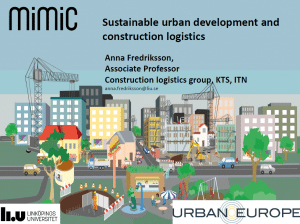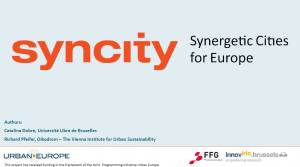What are the capacities needed to drive urban transitions to sustainable futures? Past decades have presented the knowledge and technical expertise to build more sustainable urban areas – but what are the prerequisites or strategies for going from ambition to transition? This Urban Lunch Talk will start with two brief result presentations by projects in the Making Cities Work call. Following the presentations, invited guests will exchange knowledge and give examples of capacities needed to drive urban transitions. Are there experiences, guidelines and approaches to learn from? Registered participants to this event can listen to invited guests and participate via the chat and the polls. At the end of the event, the chat will remain open for 15 more minutes and participants will be invited to a Slack channel for continued self-organised chat and exchange. Representatives from the upcoming call for project proposals ERA-NET Cofund Urban Transformation Capacities (ENUTC) will be available for questions about the call in the webinar chat.
You are currently viewing a placeholder content from YouTube. To access the actual content, click the button below. Please note that doing so will share data with third-party providers.
Recording of Urban Lunch Talk #15 (4 Dec 2020) also available on Youtube.
Guests
- Martin Kornberger works with strategies for distributed and collective action, teaching strategy as practice to cohorts of highly experienced leaders from across the public sector in Denmark. Martin recently wrote the chapter “Strategy: What is more important than getting things done? Learning from Sustainable Sydney 2030” in the book “Dilemmas of Sustainable Urban Development – A View From Practice” (in this book you also find the chapter “Programming Urban Transitions in Practice” by JPI Urban Europe).
- M’Lisa Lee Colbert is the Associate Director of The Nature of Cities, an international platform for transdisciplinary dialogue and urban solutions: “We curate the sharing of diverse, transformative ideas about cities as ecosystems of people, nature, and infrastructure”. M’Lisa designs and develops transdisciplinary projects and programming. The mission of The Nature of Cities is to curate joined conversations about urbanism across ways of knowing and modes of action. The organisation strives for cities worldwide that are resilient, sustainable, livable, and just.
- Sascha Benes works as an urban planner and digital strategist at Örebro Municipality, a middle-sized city in Sweden – and one of the fastest growing ones (due to an increase in children and elderly). Creating a robust urban (and rural) system and finding innovative solutions effectively is key to the sustainable provision of services within, and liveability of the municipality as a whole. Örebro has experiences of working with organisational trust and so called “incremental change management” as means for urban robustness.
- Richard Pfeifer, from the SYNCITY project, will present how urban transformation projects, especially in deprived areas with highly diverse communities, can reach high acceptance by dwellers and have positive consequences for the urban society as such, the economy and the overall co-living in the city. Participation processes are often subject to hidden agendas or implicit values conveyed through discursive practices in actor constellations. SYNCITY opted for a transparent way to deal with this dilemma and developed the Syncity Sustainability Criteria – a normative framework for steering through the midst of participatory urban planning.
- Anna Fredriksson, from the MIMIC project, will present results on stakeholder dialogue, logistics optimization, mobility, and smart governance to facilitate and support logistics around urban construction sites. MIMIC has created a decision support that shows how the impact of a decision will affect the next step and decision. “Our goal is always to minimise the storage- and transport costs. In the end this is also the most sustainable solution, so it is a gain for everyone, both the climate and the developer’s wallet”, says Anna Fredriksson.
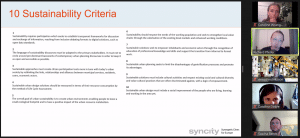
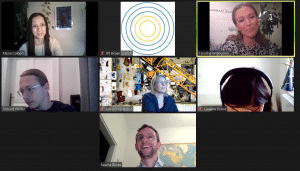
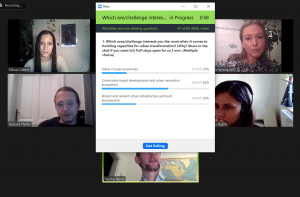

Background
The Urban Lunch Talks in 2020 have been shaped on the theme of “taking action” as they followed up on the 2019 talks introducing the dilemma-driven approach in JPI Urban Europe’s Strategic Research and Innovation Agenda (SRIA) 2.0. At the same time, supported projects in Making Cities Work (which targets R&I implementation issues) are delivering results. As part of the preparation of the next European Research and Innovation Framework Programme – Horizon Europe – new mechanisms for public-public partnerships are under development. One of the candidates for such a European partnership is the Driving Urban Transitions to a Sustainable Future (DUT) partnership, which builds upon the achievements of JPI Urban Europe. The partnership aims to strengthen JPI Urban Europe’s joint efforts of bringing knowledge and evidence into action – towards sustainable urban development.
Research and innovation (R&I) contribute with evidence on urban dilemmas and can support capacity building for urban transformation: turning wicked issues into synergistic potential. This needs to be supported by aligning ongoing related initiatives and by building upon existing experience and knowledge. You can read more about these themes in JPI Urban Europe’s upcoming ERA-NET Cofund urban transformation capacities (ENUTC).
Introduction to “urban transformation capacities”
Urban transformation capacities involve the process of building capacities such as skills, insights, tools, organisational and personal capabilities, working methods and processes, access to experiences and verifiable knowledge. Developing strategies to enhance urban transformation capacities also includes public sector innovation and new approaches to governance, building of new structures and procedures e.g. for envisioning and scenario development; for carrying out, evaluating and scaling up urban experiments; for collaboration of the public sector, private sector, academia and civil society; for integrating policies across sectors; and for learning, monitoring and reflection of change processes etc. Capacity building is also enabled and supported by using new technologies and tools, knowledge co-creation, urban experimental approaches at different scales (e.g. urban living labs, city labs, maker spaces), policy labs, and other kinds of systematic approaches for stakeholder including non-academic stakeholder involvement.
Transnational policy documents such as Transforming our world: the 2030 Agenda for Sustainable Development, the New Urban Agenda and the Urban Agenda for the EU, stress the great urgency for a rapid sustainable transformation of cities and urban areas worldwide. They present ambitious and comprehensive targets addressing a wide variety of urban challenges in order to make cities and human settlements inclusive, safe, healthy, resilient and sustainable. Furthermore, they highlight the need to stake out pathways for an urban transformation that strengthen relevant stakeholders and actors’ capacities to tackle the sustainability challenges ahead. This transformation requires capacity building by and for all actors involved in the transition to a sustainable future.
(Source: the ENUTC draft call text, 2020-12-01)
Questions about this event? Please contact caroline.wrangsten@jpi-urbaneurope.eu


